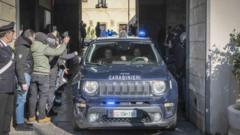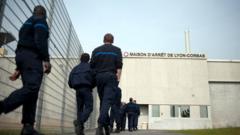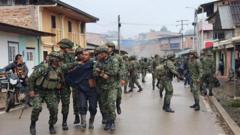In a recent anti-mafia operation, authorities unveil the adaptations of Sicily's Mafia, while gangsters lament dwindling recruitment and aspirations.
Sicilian Mafia Struggles with Modernization as Anti-Mafia Crackdown Intensifies

Sicilian Mafia Struggles with Modernization as Anti-Mafia Crackdown Intensifies
Sicily's organized crime sees new generation adapting strategies, but calls for a return to the glory days.
In a significant move against organized crime, Italian authorities launched a crackdown on the Sicilian Mafia, aiming to dismantle the resurgence of a governing body or "cupola." However, wiretaps reveal a stark reality: the Mafia is grappling with the changing landscape of crime and expressing a longing for its glory days.
Giancarlo Romano, a rising gang figure in Palermo's Brancaccio neighborhood, was the subject of a wiretap where he bemoaned the low caliber of new recruits. "They don't produce mobsters like they used to," he lamented before his assassination last year. Despite this dissatisfaction, anti-mafia prosecutor Maurizio de Lucia cautioned, "Cosa nostra is alive and present," underscoring the resilience of organized crime on the island.
Evolving tactics highlight a generational shift among gang leaders, who now rely on encrypted communications and technology to evade surveillance, engaging in drug trafficking, money laundering, and online gambling — often in collaboration with larger organizations like the 'Ndrangheta from mainland Italy. During the recent operation, authorities executed 181 arrest warrants across Palermo, revealing that even incarcerated gangsters managed to orchestrate criminal activities via video links.
National anti-mafia prosecutor Giovanni Melillo emphasized the enduring influence of the Mafia even within high-security prisons, where communication systems are vulnerable to exploitation. Recent intelligence indicated that one imprisoned gangster monitored a beating he orchestrated in real-time, illustrating the audacity of these criminals.
Prime Minister Giorgia Meloni commended the anti-mafia initiative by the Carabinieri military police and reaffirmed the government's relentless efforts against organized crime. Notably, many suspects arrested were in their 20s and 30s, reflecting the Mafia's ongoing struggle to recruit capable operatives.
Romano's dissatisfaction extended to the diminishing scope of criminal operations today. He criticized the current Mafia's focus on small-scale drug sales, contrasting it with the monumental heists of the past. His assassination in February 2024 over alleged online gambling extortion led to further arrests, revealing the tumultuous state of the Mafia.
Yet, amid aspirations for modernization, traditional codes remain firmly entrenched. "Cosa nostra is like marriage. You are married to this wife and you stay with her all your life," one mob member relayed in a conversation, emphasizing the bonds of loyalty that define the organization. Despite the decline of traditional Mafia tactics, the enduring ethos suggests that organized crime in Sicily continues to adapt and survive.
Giancarlo Romano, a rising gang figure in Palermo's Brancaccio neighborhood, was the subject of a wiretap where he bemoaned the low caliber of new recruits. "They don't produce mobsters like they used to," he lamented before his assassination last year. Despite this dissatisfaction, anti-mafia prosecutor Maurizio de Lucia cautioned, "Cosa nostra is alive and present," underscoring the resilience of organized crime on the island.
Evolving tactics highlight a generational shift among gang leaders, who now rely on encrypted communications and technology to evade surveillance, engaging in drug trafficking, money laundering, and online gambling — often in collaboration with larger organizations like the 'Ndrangheta from mainland Italy. During the recent operation, authorities executed 181 arrest warrants across Palermo, revealing that even incarcerated gangsters managed to orchestrate criminal activities via video links.
National anti-mafia prosecutor Giovanni Melillo emphasized the enduring influence of the Mafia even within high-security prisons, where communication systems are vulnerable to exploitation. Recent intelligence indicated that one imprisoned gangster monitored a beating he orchestrated in real-time, illustrating the audacity of these criminals.
Prime Minister Giorgia Meloni commended the anti-mafia initiative by the Carabinieri military police and reaffirmed the government's relentless efforts against organized crime. Notably, many suspects arrested were in their 20s and 30s, reflecting the Mafia's ongoing struggle to recruit capable operatives.
Romano's dissatisfaction extended to the diminishing scope of criminal operations today. He criticized the current Mafia's focus on small-scale drug sales, contrasting it with the monumental heists of the past. His assassination in February 2024 over alleged online gambling extortion led to further arrests, revealing the tumultuous state of the Mafia.
Yet, amid aspirations for modernization, traditional codes remain firmly entrenched. "Cosa nostra is like marriage. You are married to this wife and you stay with her all your life," one mob member relayed in a conversation, emphasizing the bonds of loyalty that define the organization. Despite the decline of traditional Mafia tactics, the enduring ethos suggests that organized crime in Sicily continues to adapt and survive.




















